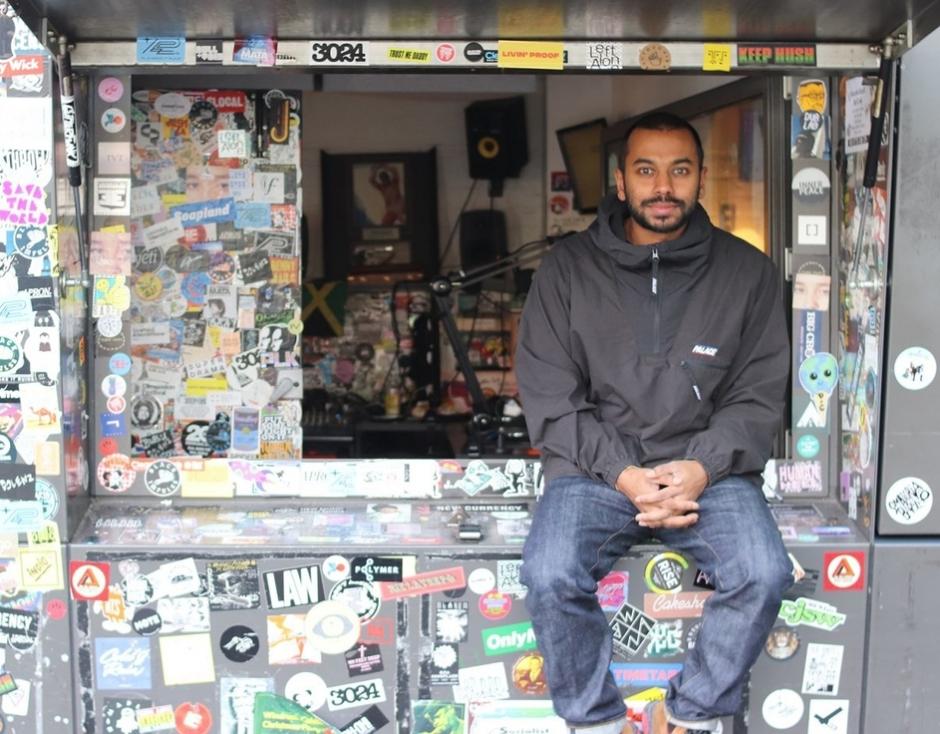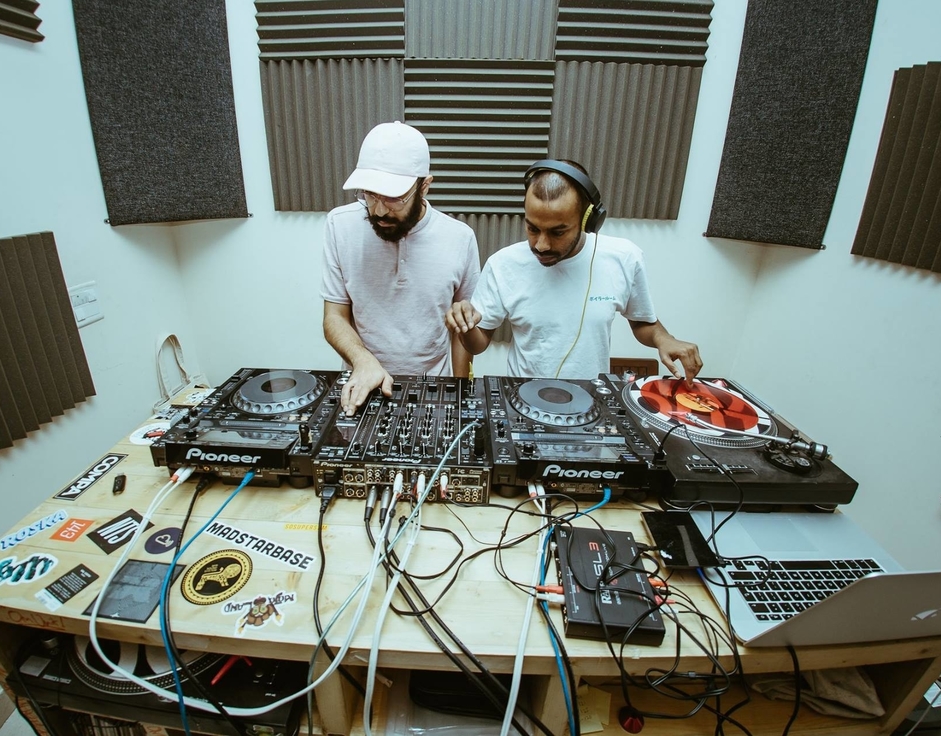Radio stations I have spun in
November 2020

Raj Chaudhuri at the original NTS studios in East London
Veteran spinner and host Raj Chaudhuri remembers the many DJ booths where he has taken to the airwaves
Last week, social media was flooded with photos of a tiny sticker-covered shack in Dalston in East London, with a ripped-out window cover and some building works. With it came a chorus of lamenting DJs worldwide, fans expressing their mourning, and some regret-filled cries from certain individuals on how they never got to make the pilgrimage and get that iconic photo through the window.
This was the NTS studio in London, now ripped apart for new developments, and another victim of dreaded gentrification. NTS itself will be fine – indeed, they are moving literally to the other side of Gillett Square, about 20 metres from the original studio, with a bigger space, better layout and better sound. So why is everyone – including myself – upset?
Sometimes with radio studios, it’s not how good the place is for doing the job – DJing, hosting, broadcasting. Sometimes it’s about what feels like home. It’s where you can hang out and know there will be a good soundtrack. It’s where you know you will see friends and comrades, and perhaps bump into a superstar DJ or producer stuck in the same shack as the rest of us. It’s like Norm Peterson walking into the bar in Cheers… except Norm is Charlie Bones and NTS founder Femi Adeyemi is Ted Danson’s Sam.
I grew up with that studio, figuratively and musically. My first radio show for NTS was on their second day of broadcasting, and I’ve been with them ever since. For the first year, I was too nervous to speak on the mic. Almost a decade later, I genuinely couldn’t imagine my life without doing radio… and I’m also chatty as hell now.
UK stations were born out of the ashes and rich legacy of pirate radio, and online broadcasting and community radio have now spread across the world. I’ve appeared on my fair share of music stations, now. After a lifelong career in nightclubs, I often prefer radio to club sets – there is no pressure to make a dancefloor move, to sell tickets. There is a freedom which all DJs get a kick out of. The whole time I’ve been a DJ online, I’ve never once been told what I needed to play. You’re just as likely to hear a gospel special as a jungle set on my radio show. No playlists, no guidelines, no watershed, not even any real feedback, just occasionally bumping into a NTS staff member at a party or while sipping a drink at Kaffa Coffee in Gillett Square after your broadcast – “nice show, man”.
The best radio stations feel like you’re part of a community, of those who have passed before you, and those who will come after you. On the bench outside of the Balamii studios in in Holdrons Retail Arcade in Peckham, sipping on shop-bought cans of beer, you are surrounded by a wall of signed polaroids of all the DJs that have sat exactly where you are sitting. Then there’s Boxout FM in Delhi, where you hang out in the basement of a converted house – the same basement that has hosted multiple impromptu after hours parties. The Boxout crew always seem to roll deep wherever they go. The same rang true when I hung out with Seoul Community Radio in South Korea – it was always a posse uniting a motley crew of DJs and staff, volunteers (in the broke, formative years) and eventually employees (when the money started to trickle in).
These gangs have gang vibes. Often the merch is the equivalent of a gang tattoo, a knowing look, or a secret handshake. I remember back in the magical era of the FWD>> club at East London’s Plastic People, I was the outsider that looked on with envy at the inner-circle of DJs and dubstep die-hards in the crowd, their Rinse logo T-shirts worn like a soldier's uniform.
Sometimes the lines blur between online radio and what you might call legit radio. I remember the first time I played on Rinse FM, I played a bunch of rap music. A young intern/producer ran in to the studio looking flustered, saying “we can’t have swearing on FM radio” – oh yeah, Rinse is now an FM station! In my mind, and I mean this in the most endearing way possible, Rinse is, and always will be a pirate station. I wasn't used to having to censor anything and so didn't have any clean radio edits to play on the show. And all rap music, even the stuff that you wouldn't expect, has swear words. All of it. We got on the mic: “We’ve just realised we aren’t allowed swear words on FM Radio,” as another flurry of swear words came in on the track. “Oh fuck, this one’s got swearing as well. Shit, sorry.”. Our mic announcements were not helping. The producer was having a nervous breakdown. It was a few years before Rinse FM asked me back to do another show.
Doing online radio is not without its technical and physical challenges: battered turntables, missing needles, CDJs and mics all wired wrong, and the stress of trying to fix these issues live on air. With the original NTS studio, I mastered the art of DJing and hosting live radio whilst engaging and navigating conversations with drunk homeless people through the window. Often, they were simply being friendly, chatty and enjoying the music – but they could prove quite a distraction to your dreams of being the online radio incarnation of John Peel or Jeff Mills: “OK, here’s a lighter… yeah, it’s a radio station… sorry mate, I’m in the middle of a show”.

Mo City and Raj Chaudhuri at Boxout FM, New Delhi
It’s all a stark contrast to the time I did a BBC Radio 1 show – we needed security passes to even enter the building, and were elevated to the super slick studios on (what felt like) the 100th floor of Broadcasting House. There were two producers, ten hours of prep, perfect pre-recorded mixes, multiple takes of dialogue and links on beautifully crisp compressor mics, multiple rounds of feedback, all finally stitched together to get a seamless and slick two hour show. It’s not like that with online radio. Two hours is two hours: live, now, go! And I wouldn't want it any other way.
Since March, I’ve been broadcasting my NTS show from my living room. Alongside finally taking the plunge and producing music for the first time, I can honestly say doing my NTS show has kept me sane during the 2020 lockdown. It is a lifeline and creative outlet to look forward to in the midst of the seemingly futile existence of being a DJ during a global pandemic. It’s an excuse to organise playlists and trawl through Bandcamp for brand new club music, a reason to make a dent in your wallet even though you’ve lost all your income but at least you feel like you’re supporting your peers. And it’s a fixed routine to maintain your DJ muscle memory, keeping it well-flexed and trained for when the clubs finally reopen.
Doing online radio from your house definitely has its advantages – I’ve done every single one in my jogging bottoms, just rolled out of bed and without the restrictive burden of having to wear underwear. Rather than the chats in the studio and through the windows to friends and Dalston locals, the new community is now the online chat room, and it’s more engaged and buzzing than ever, all of us united knowing that we all have to endure lockdown together.
Despite being a very solitary exercise at the moment, in many ways, I feel more connection with my radio show than ever before. There’s a quick WhatsApp call with the NTS producers to go through a soundcheck/tech run-through a few minutes minutes before the show, then two hours of exhilaration as you get to DJ loudly (sorry, neighbours) and feel connected to people on the outside. There’s online chat room banter from the NTS regulars, seals of approval of certain mixes and track selections on social media, text and WhatsApp messages from friends I haven't heard from in months saying they are locked in, and Track ID requests from strangers. I’m pretty bad at communication usually. I receive so many messages and communication through way too many channels. It can be overwhelming. But this is the digital surrogate for the friendly chat in the smoking area of the club and it validates a sense of meaning for a DJ that just really, really misses playing to a dark and loud dancefloor.
There’s a feeling of sadness and realisation when it’s over. The glow wears off, and my living room slowly transforms from a temporary night club back to … well, my living room. The countdown for my next radio show has just been reset. I guess I should probably make myself some lunch and send some emails now.
This is the big difference between a home broadcast and a studio. In the studio, you hand over. Someone takes the baton after your show, and keeps the music going. Sometimes they are politely quiet, keeping a distance at the back of the studio, and waiting patiently for you to play your last track. Often, they are anxious or eager, plugging in USBs or Serato or checking the needles on the turntables over you, and invading your personal space (I have also been this person, and I apologise to any hosts I’ve annoyed previously). Sometimes it’s a friend, a stranger, of a well-known artist, you feel part of a chain. There is someone before you and someone after you, and you have the sense of being part of something bigger.
Like many other DJs that have passed through that tiny little shack in Gillett Square, I’m going to miss that place. I have too many memories to not feel a sense of mourning. But I look forward to new memories being made in the next NTS studio. Like all great radio stations that act like a foster home for orphaned DJs, we just need a place that we can call home.
Subscribers can read Michaelangelo Matos’s Primer on Pirate Radio DJ sets in The Wire 410. You can listen to past editions of The Wire’s radio programmes including archived episodes of Rewired which was broadcast by NTS here. You can browse the full archive of Raj Chaudhuri's shows at the NTS website.
Comments
Superb article. I did a session there too a few years ago. Shane really but glad to hear tgey are still in Gillett Square.
Dubplate Pearl
Great read Raj..... beautiful and delicate insights.
Mafioko
Leave a comment